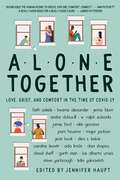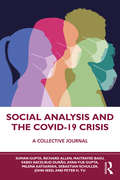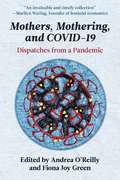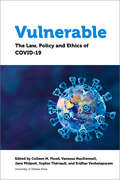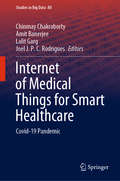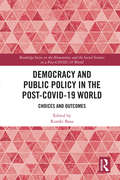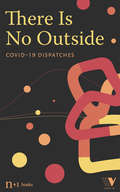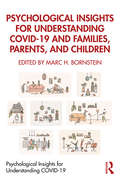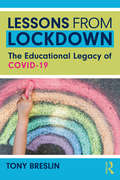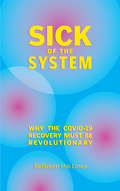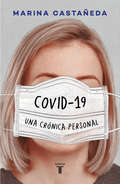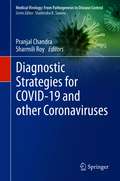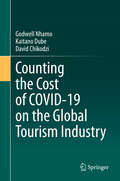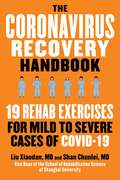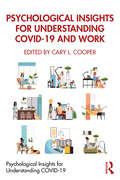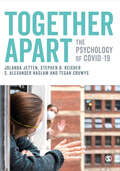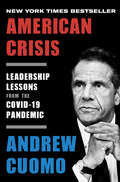Special Collections
Everything you ever wanted to know about the COVID-19 pandemic
- Table View
- List View
Alone Together
by Jenna Blum and Garth Stein and Kwame Alexander"Could there be a timelier gift to quarantined readers...? I doubt it."—The Washington Post"A heartening gathering of writers joining forces for community support."—Kirkus Reviews"Connects writers, readers, and booksellers in a wonderfully imaginative way. It's a really good book for a really good cause"—Bestselling author James PattersonALONE TOGETHER: Love, Grief, and Comfort in the Time of COVID-19 is a collection of essays, poems, and interviews to serve as a lifeline for negotiating how to connect and thrive during this stressful time of isolation as well as a historical perspective that will remain relevant for years to come.All contributing authors and business partners are donating their share to The Book Industry Charitable Foundation (Binc), a nonprofit organization that coordinates charitable programs to strengthen the bookselling community.The roster of diverse voices includes Faith Adiele, Kwame Alexander, Jenna Blum, Andre Dubus III, Jamie Ford, Nikki Giovanni, Pam Houston, Jean Kwok, Major Jackson, Devi S. Laskar, Caroline Leavitt, Ada Limón, Dani Shapiro, David Sheff, Garth Stein, Luis Alberto Urrea, Steve Yarbrough, and Lidia Yuknavitch.The overarching theme is how this age of isolation and uncertainty is changing us as individuals and a society."Alone Together showcases the human desire to grieve, explore, comfort, connect, and simply sit with the world as it weathers the pandemic. Jennifer Haupt's timely and moving anthology also benefits the Book Industry Charitable Foundation, making it a project that is noble in both word and deed."—Ann Patchett, Bestselling author, bookseller, and Co-Ambassador for The Book Industry Charitable Foundation
Latam Airlines and COVID-19: Seeking Bankruptcy Protection in the United States
by Laura Alfaro and Sarah Jeong and Carlos Vilches and Mauricio LarrainOn May 26, 2020, Latam Airlines became the largest airline in the world to be driven to bankruptcy by COVID-19. With a complex debt structure and international investor composition, the company decided to file for bankruptcy protection in the United States, which offered a more flexible reorganization procedure than the local bankruptcy process. After the filing announcement, the company reached an all-time-low stock market valuation. Some experts questioned whether the bankruptcy filing of Latam Airlines in the United States could be detrimental for the development of the Chilean capital market. Even if the company succeeded financially, would it be able to adapt to a different way of flying post-COVID?
Social Analysis and the COVID-19 Crisis
by Richard Allen and Suman Gupta and John Seed and Maitrayee Basu and Fabio Akcelrud Durão and Ayan-Yue Gupta and Milena Katsarska and Sebastian Schuller and Peter H. TuThis book is a collective journal of the COVID-19 pandemic. With first-hand accounts of the pandemic as it unfolded, it explores the social and the political through the lens of the outbreak. Featuring contributors located in India, the United States, Brazil, the United Kingdom, Germany, and Bulgaria, the book presents us with simultaneous multiple histories of our time. The volume documents the beginning of social distancing and lockdown measures adopted by countries around the world and analyses how these bore upon prevailing social conditions in specific locations. It presents the authors’ personal observations in a lucid conversational style as they reflect on themes such as the reorganization of political debates and issues, the experience of the marginalized, theodicy, government policy responses, and shifts into digital space under lockdown, all of these under an overarching narrative of the healthcare and economic crisis facing the world. A unique and engaging contribution, this book will be useful to students and researchers of sociology, public health, political economy, public policy, and comparative politics. It will also appeal to general readers interested in pandemic literature.
Mothers, Mothering, and COVID-19
by Andrea O’Reilly;Fiona Joy GreenThere has been little public discussion on the devastating impact of Covid-19 on mothers, or a public acknowledgement that mothering is frontline work in this pandemic. This collection of 45 chapters and with 70 contributors is the first to explore the impact of the pandemic on mothers' care and wage labour in the context of employment, schooling, communities, families, and the relationships of parents and children. With a global perspective and from the standpoint of single, partnered, queer, racialized, Indigenous, economically disadvantaged, disabled, and birthing mothers, the volume examines the increasing complexity and demands of childcare, domestic labour, elder care, and home schooling under the pandemic protocols; the intricacies and difficulties of performing wage labour at home; the impact of the pandemic on mothers' employment; and the strategies mothers have used to manage the competing demands of care and wage labour under COVID-19. By way of creative art, poetry, photography, and creative writing along with scholarly research, the collection seeks to make visible what has been invisibilized and render audible what has been silenced: the care and crisis of motherwork through and after the COVID-19 pandemic.
Vulnerable
by Ravi Malhotra and Jeffrey Simpson and Paul Daly and David Robitaille and Jomo Kwame Sundaram and Katherine Fierlbeck and Grégoire Webber and Pat Armstrong and Hugh Armstrong and Jane Philpott and Delphine Nakache and Ivy Bourgeault and Daniel Weinstock and Aimée Craft and Anis Chowdhury and Teresa Scassa and Chidi Oguamanam and E. Richard Gold and Olivia Lee and Carissima Mathen and Steven J. Hoffman and Vanessa Gruben and Martha Jackman and Bryan Thomas and Lorian Hardcastle and Deborah McGregor and Jeffery Hewitt and Michelle Giroux and Amir Attaran and Adam R. Houston and Alexandra Flynn and Mel Cappe and Tim Caulfield and Marie-France Fortin and Jennifer A. Quaid and Dr Kumanan Wilson and Kelly Bronson and Jason Millar and Vardit Ravitsky and Terry Skolnik and Yves Le Bouthillier and Martine Lagacé and Linda Garcia and Leilani Farha and Kaitlin Schwan and Adelina Iftene and Jamie Chai Liew and Y. Y. Chen and Anne Levesque and Dr Kwame McKenzie and Jennifer A. Chandler and Dr Mona Gupta and Yasmin Khaliq and Simon Hatcher and Tess Sheldon and Katherine Lippel and Louise Bélanger-Hardy and Sarah Berger Richardson and Sam Halabi and Patrick Fafard and Céline Castets-Renard and Eleonore Fournier-Tombs and Jeremy De Beer and Matthew Herder and Jason W. NickersonThe novel coronavirus SARS-CoV-2, which causes the disease known as COVID-19, has infected people in 212 countries so far and on every continent except Antarctica. Vast changes to our home lives, social interactions, government functioning and relations between countries have swept the world in a few months and are difficult to hold in one’s mind at one time. That is why a collaborative effort such as this edited, multidisciplinary collection is needed. This book confronts the vulnerabilities and interconnectedness made visible by the pandemic and its consequences, along with the legal, ethical and policy responses. These include vulnerabilities for people who have been harmed or will be harmed by the virus directly and those harmed by measures taken to slow its relentless march; vulnerabilities exposed in our institutions, governance and legal structures; and vulnerabilities in other countries and at the global level where persistent injustices harm us all. Hopefully, COVID-19 will forces us to deeply reflect on how we govern and our policy priorities; to focus preparedness, precaution, and recovery to include all, not just some. Published in English with some chapters in French.
Wilderness Safaris: Responses to the Covid-19 Crisis
by James E. Austin and Herman Leonard and Megan Epler WoodCase
Internet of Medical Things for Smart Healthcare
by Amit Banerjee and Joel J. P. C. Rodrigues and Chinmay Chakraborty and Lalit GargThis book covers COVID-19 related research works and focuses on recent advances in the Internet of Things (IoT) in smart healthcare technologies. It includes reviews and original works on COVID-19 in terms of e-healthcare, medicine technology, life support systems, fast detection, diagnoses, developed technologies and innovative solutions, bioinformatics, datasets, apps for diagnosis, solutions for monitoring and control of the spread of COVID-19, among other topics. The book covers comprehensive studies from bioelectronics and biomedical engineering, artificial intelligence, and big data with a prime focus on COVID-19 pandemic.
Democracy and Public Policy in the Post-COVID-19 World
by Rumki BasuAfter the COVID-19 disaster, ‘old’ frailties and inadequacies in agriculture and industrial productive capacities, in public health and transport systems have evinced sharply in the open, reopening the debates over public policy reforms as never before. This volume: Studies the likely impact of the COVID-19 pandemic on future policy making in India and other democracies. Critically looks at the available theoretical frameworks, models and approaches used in the policy making process and studies their contemporary relevance. Balances theoretical approaches with concrete case studies. Examines India’s policies on education, health, e-governance, gender and work, and also provides recommendations for the future. An important and timely contribution, this book will be of great interest to scholars and researches of public administration, public policy, political theory, globalization and global democracy.
Reopening K-12 Schools During the COVID-19 Pandemic
by Board on Children, Youth, and Families and Division of Behavioral and Social Sciences and Education and Board on Science Education and National Academies of Sciences, Engineering, and Medicine and Standing Committee on Emerging Infectious Diseases and 21st Century Health Threats and Committee on Guidance for K-12 Education on Responding to COVID-19The COVID-19 pandemic has presented unprecedented challenges to the nation's K-12 education system. The rush to slow the spread of the virus led to closures of schools across the country, with little time to ensure continuity of instruction or to create a framework for deciding when and how to reopen schools. States, districts, and schools are now grappling with the complex and high-stakes questions of whether to reopen school buildings and how to operate them safely if they do reopen. These decisions need to be informed by the most up-to-date evidence about the SARS-CoV-2 virus that causes COVID-19; about the impacts of school closures on students and families; and about the complexities of operating school buildings as the pandemic persists. Reopening K-12 Schools During the COVID-19 Pandemic: Prioritizing Health, Equity, and Communities provides guidance on the reopening and operation of elementary and secondary schools for the 2020-2021 school year. The recommendations of this report are designed to help districts and schools successfully navigate the complex decisions around reopening school buildings, keeping them open, and operating them safely.
Framework for Equitable Allocation of COVID-19 Vaccine
by Board on Population Health and Public Health Practice and Board on Health Sciences Policy and National Academies of Sciences, Engineering, and Medicine and Health and Medicine Division and Committee on Equitable Allocation of Vaccine for the Novel CoronavirusIn response to the coronavirus disease 2019 (COVID-19) pandemic and the societal disruption it has brought, national governments and the international community have invested billions of dollars and immense amounts of human resources to develop a safe and effective vaccine in an unprecedented time frame. Vaccination against this novel coronavirus, severe acute respiratory syndrome coronavirus 2 (SARS-CoV-2), offers the possibility of significantly reducing severe morbidity and mortality and transmission when deployed alongside other public health strategies and improved therapies. Health equity is intertwined with the impact of COVID-19 and there are certain populations that are at increased risk of severe illness or death from COVID-19. In the United States and worldwide, the pandemic is having a disproportionate impact on people who are already disadvantaged by virtue of their race and ethnicity, age, health status, residence, occupation, socioeconomic condition, or other contributing factors. Framework for Equitable Allocation of COVID-19 Vaccine offers an overarching framework for vaccine allocation to assist policy makers in the domestic and global health communities. Built on widely accepted foundational principles and recognizing the distinctive characteristics of COVID-19, this report's recommendations address the commitments needed to implement equitable allocation policies for COVID-19 vaccine.
There Is No Outside
by Verso BooksAn urgent collection of essays on the global pandemic, from n+1 and Verso Books
A collaboration between the renowned magazine of literature and politics, n+1, and Verso Books, this collection tracks the course of Covid-19 across the circuits of global capital to New York&’s prisons and emergency rooms, Los Angeles&’s homeless encampments, and the migrant camps in Greece; and into the intimate spaces of our homes, our ideas of how to live, and into our bodies and cells.
We hear from sex workers without work and sailors quarantined on their ships, witness the pandemic from the quiet devastation of upstate New York and quarantined Rome as well as the streets of Delhi, Kashmir, and London and the emergency room of a New York City hospital. From some of the most exciting and thoughtful young writers around the globe, There Is No Outside explores the unspooling wreckage of Covid-19 and helps us on what might come in the aftermath.
With contributions from Andrew Liu, Rachel Ossip, Gabriel Winant, Francesco Pacifico, Sarah Resnick, Teresa Thornhill, Shigraf Zahbi, Debjani Bhattacharyya, Banu Subramaniam, Mark Krotov, Karim Sariahmed, Ana Cecilia Alvarez, Jack Norton, Laleh Khalili, Aaron Timms, Sonya Aragon, Sean Cooper, Chloe Aridjis, and Marco Roth, and with an introduction by Jessie Kindig.
Psychological Insights for Understanding COVID-19 and Families, Parents, and Children
by Marc H. BornsteinWith specially commissioned introductions from international experts, the Psychological Insights for Understanding COVID-19 series draws together previously published chapters on key themes in psychological science that engage with people’s unprecedented experience of the pandemic. This volume collects chapters that address prominent issues and challenges presented by the SARS-CoV-2 pandemic to families, parents, and children. A new introduction from Marc H. Bornstein reviews how disasters are known to impact families, parents, and children and explores traditional and novel responsibilities of parents and their effects on child growth and development. It examines parenting at this time, detailing consequences for home life and economies that the pandemic has triggered; considers child discipline and abuse during the pandemic; and makes recommendations that will support families in terms of multilevel interventions at family, community, and national and international levels. The selected chapters elucidate key themes including children’s worry, stress and parenting, positive parenting programs, barriers which constrain population-level impact of prevention programs, and the importance of culturally adapting evidence-based family intervention programs. Featuring theory and research on key topics germane to the global pandemic, the Psychological Insights for Understanding COVID-19 series offers thought-provoking reading for professionals, students, academics, policy makers, and parents concerned with the psychological consequences of COVID-19 for individuals, families, and society.
Data Privacy During Pandemics
by Ricardo Sanchez and Benjamin Boudreaux and Matthew A. DeNardo and Sarah W. Denton and Katie Feistel and Hardika DayalaniAs part of the response to the COVID-19 pandemic, governments worldwide have deployed mobile phone surveillance programs to augment public health interventions. However, these programs raise privacy concerns. The authors of this report examine whether two goals can be achieved concurrently: the use of mobile phones as public health surveillance tools to help manage COVID‑19 and future crises, and the protection of privacy and civil liberties.
Lessons from Lockdown
by Tony BreslinLessons from Lockdown explores the impact of COVID-19 on our schooling systems, on the young people and families that they serve and on all who work in – and with – our schools, and asks what the long-term ramifications of the pandemic might be for the pedagogy and purpose of formal education. Drawing on the voices of more than a hundred pupils, parents and professionals, it reveals how teachers and learners are adapting practice in areas such as curriculum modelling, parental engagement, assessment and evaluation and blended and online learning. In this timely new book, Tony Breslin draws on his experience as a teacher, researcher, examiner, school governor and policy influencer to assess what the educational legacy of COVID-19 could be, and the potential that it offers for reframing how we ‘do’ schooling. Whatever your place in this landscape, Lessons from Lockdown is a must-read for all concerned about the shape and purpose of schooling systems in mature economies – schooling systems and economies set on recovering from the kind of ‘system shock’ that the pandemic has delivered.
Sick of the System
by John Clarke and Richard Swift and Emma Jackson and Justin Piché and Alberto Toscano and Jamie Swift and Harry Glasbeek and Gary Kinsman and Kai Cheng Thom and Robyn Maynard and Andrew Jackson and Anita Girvan and James T. Brophy and Nicole Marie Burton and Dallas Hunt and El Jones and Margaret M. Keith and Julie S. Lalonde and Wayne Lewchuk and Jane E. McArthur and Alexander McClelland and Karen Messing and Elaine Power and Gina Starblanket and Hugh D.A. GoldringFamilies left grieving; small businesses shuttered; communities in lockdown; precarious workers set adrift; health care workers stressed beyond endurance. The COVID-19 pandemic has shaken the world to its core. But the cracks already ran deep. Featuring essays on poverty, health care, incarceration, basic income, policing, Indigenous communities, and more, this anthology delivers a stinging rebuke of the pre-pandemic status quo and a stark exposé of the buried weaknesses in our social and political systems. As policy makers scramble to bail out corporations and preserve an unsustainable labour market, an even greater global catastrophe – in the form of ecological collapse, economic recession, and runaway inequality – looms large on the horizon. What can we do? From professors to poets, the authors of Sick of the System speak in one voice: We can turn our backs on “normal.” We can demand divestment, redistribution, and mutual aid. We can seize new forms of solidarity with both hands. As the world holds its breath, revolutionary ideas have an unprecedented chance to gain ground. There should be no going back.
COVID-19 Testing at Everlywell
by Jeffrey J. Bussgang and Olivia HullIn March 2020, as COVID-19 spreads rapidly across the U.S., Everlywell founder Julia Cheek considers how to respond as a small start-up specializing in at-home lab testing. After making dramatic budget cuts, she decides to pivot the organization to address the country's testing shortage. But after a hectic few weeks building capacity at her partner labs to 30,000 COVID daily tests, the U.S. Food and Drug Administration (FDA) releases a statement warning the public that it has not granted approval for at-home tests. Cheek must decide whether to return to her core business or persist in focusing her nascent organization on COVID-19 tests, an opportunity whose commercial merit is unclear.
COVID-19 Una crónica personal
by Marina CastañedaCon su particular humor y voz, Marina Castañeda hace un recorrido por su experiencia a partir del encierro por esta pandemia que ha sacudido al planeta entero. Con su mirada aguda reflexiona sobre distintos temas como la comunidad, la violencia de género o la discriminación. Tras una larga era de estabilidad que nos había permitido vivir en (relativa) paz y prosperidad, nos habíamos acostumbrado a la libertad -de movimiento, de expresión, de asamblea, de religión y de estilo de vida. Como parte de las clases medias que habían surgido desde la Segunda Guerra Mundial, podíamos pagarnos vacaciones, restaurantes, y comprarnos toda clase de bienes y servicios que antes eran de lujo. Nos habíamos vuelto consumistas e individualistas de ultranza. Nos habíamos desprendido poco a poco de nuestros lugares y familias de origen y de nuestros vecinos y barrios. Nos interesaba poco la población "invisible" que nos permitía vivir a gusto sin ocuparnos de las bases materiales de la existencia cotidiana. Pedíamos algo en línea y milagrosamente llegaba a la puerta de nuestras casas. Defendíamos nuestros derechos sin ocuparnos demasiado de los demás. Nuestros hábitos de habían vuelto una jaula de oro. El coronavirus cambió todo. Nos hizo recordar, o tomar consciencia, de muchas cosas que habíamos dado por sentadas: dependíamos de nuestros empleados de servicio, de nuestros vecinos, de todos los "invisibles", e incluso de las autoridades para imponer las medidas sanitarias indispensables, orientarnos y apoyarnos. Esta nueva forma de concebir los servicios públicos, como un gasto que debe cubrir cada ciudadano en lo personal, era el resultado de más de 30 años de recortes presupuestarios, gastos gubernamentales enfocados en la guerra contra el narco, apoyos a los bancos y grandes empresas. El coronavirus no hizo más que sacar a relucir este abandono por parte del gobierno de sus funciones más esenciales. De pronto nos descubrimos huérfanos. Lo único que podremos esperar es que habremos aprendido sus grandes lecciones. Ojalá lo hagamos mejor la próxima vez.
The Coronavirus (COVID-19) Pandemic and the Global Economy (A)
by Alberto F. Cavallo and Christian GodwinIn early 2020, a coronavirus pandemic swept the globe, ushering in unprecedented disruptions to the global economy. Both supply and demand were decimated by lockdowns and border closings, as well as reduced spending by fearful consumers. In response, governments around the world made equally unprecedented policy moves, spending trillions of dollars on fiscal stimulus measures to bridge the gap during the self-imposed shutdown. As the pandemic progressed, governments had to weigh the costs between loss of life due to opening up their economies and the economic devastation caused by delaying a reopening.
Diagnostic Strategies for COVID-19 and other Coronaviruses
by Pranjal Chandra and Sharmili RoyThis book provides fundamental information on various techniques for the detection of SARS-CoV-2 including reverse transcriptase (RT) PCR, loop-mediated isothermal amplification, immunodiagnostic tests, and CRISPR-Cas. It reviews various testing kits and detection methodologies that are currently being used for the detection of SARS-CoV-2 and examines strategies for the post-treatment detection and monitoring of SARS-CoV-2. Further, it assesses the diagnostic potential of several SARS-CoV-2 proteins; and analyzes their structural determinants and immunogenicity.In turn, the book evaluates the potential of CRISPR-Cas 12-based assays for the detection of SARS-CoV-2 using RNA extracted from patients. Lastly, it discusses the use of miniaturized biosensors for the detection of other types of coronavirus.
Counting the Cost of COVID-19 on the Global Tourism Industry
by Godwell Nhamo and Kaitano Dube and David ChikodziThis book profiles preliminary findings on the impact of COVID-19 on the travel, tourism and hospitality sector. Starting with a narrative relating COVID-19 to the global development agendas, the book proceeds with a focus on global tourism value chains and linkages between COVID-19 and the Sustainable Development Goals (SDGs). Other perspectives addressed in separate chapters include impacts of COVID-19 on various industries within the global tourism value chain including aviation, airports, cruise ships, car rentals as well as ride and share car services, hotels, restaurants, sporting, pilgrimage and religious tourism, gaming and entertainment, and the stock market. The book also includes chapters on corporate, philanthropic and public donations, as well as tourism economic stimulus packages. It then concludes with a chapter focusing on building back a better tourism sector post-COVID-19 that strongly draws from the Sendai Framework on Disaster Risk Reduction (2015-2030) and the disaster cycle. To this end, this book is suitable as a read for several professionals in disciplines such as tourism and hospitality studies, economics, sustainable development, development studies, environmental sciences, geography, politics, planning and public health.
The Coronavirus Recovery Handbook
by Liu Xiaodan and Shan ChunleiFrom Dr. Liu Xiaodan and Dr. Shan Chunlei and their colleagues at the Shanghai Public Health Clinical Center and Lei Shenshan Hospital in Wuhan, comes a must-have guide for recovering and rehabbing after contracting the coronavirus (COVID-19). The Center for Disease Control and Prevention in the US and the World Health Organization have declared the coronavirus a worldwide health emergency. With the virus in 210 countries around the world, much focus is on the growing number of new cases. But how should those who have already contracted the virus start the recovery process? According to the clinical needs of mild and severe COVID-19 patients, The Coronavirus Recovery Handbook puts forward a series of lung rehabilitation training methods of integrated traditional Chinese and western medicine, which have been used in the Shanghai Public Health Clinical Center (affiliated to Fudan University) and Lei Shenshan Hospital in Wuhan. The pulmonary-based Qigong rehabilitation protocol (PQRP) featured in the handbook was created by Dr. Liu Xiaodan to aide in the recuperation of COVID-19 patients. Qigong is a centuries-old system of coordinated body-posture and movement, breathing, and meditation used for the purposes of health, spirituality, and martial-arts training. This is the first authoritative, comprehensive guide to recovering and rehabbing from COVID-19 with 19 easy-to-follow traditional Chinese exercises. Written in plain language, here is information that will help readers and professionals recuperate from this devastating virus. As COVID-19 continues to spread around the world—China, South Korea, Iran, Italy, Germany, the United Kingdom, Canada, and the United States—and cases continue to rise in number, the ability to regain one’s strength, especially in the lungs, is imperative. Led by Dr. Liu Xiaodan and Dr. Shan Chunlei, The Coronavirus Recovery Handbook was created by the rehabilitation medicine team of Shanghai University of Traditional Chinese Medicine, based on their previous clinical and scientific research work, combined with relevant national diagnosis and treatment guidance and the clinical experience of many experts involved in the fight against this epidemic. With 19 exercises for individuals to utilize in their recovery from COVID-19, the information in this handbook could be lifesaving. If the worst should happen, the information in this book will help you recover your strength after fighting COVID-19.
Decarcerating Correctional Facilities during COVID-19
by Division of Behavioral and Social Sciences and Education and Committee on Law and Justice and National Academies of Sciences, Engineering, and Medicine and Committee on the Best Practices for Implementing Decarceration as a Strategy to Mitigate the Spread of COVID-19 in Correctional FacilitiesThe conditions and characteristics of correctional facilities - overcrowded with rapid population turnover, often in old and poorly ventilated structures, a spatially concentrated pattern of releases and admissions in low-income communities of color, and a health care system that is siloed from community public health - accelerates transmission of the novel coronavirus (SARS-CoV-2) responsible for COVID-19. Such conditions increase the risk of coming into contact with the virus for incarcerated people, correctional staff, and their families and communities. Relative to the general public, moreover, incarcerated individuals have a higher prevalence of chronic health conditions such as asthma, hypertension, and cardiovascular disease, making them susceptible to complications should they become infected. Indeed, cumulative COVID-19 case rates among incarcerated people and correctional staff have grown steadily higher than case rates in the general population. Decarcerating Correctional Facilities during COVID-19 offers guidance on efforts to decarcerate, or reduce the incarcerated population, as a response to COIVD-19 pandemic. This report examines best practices for implementing decarceration as a response to the pandemic and the conditions that support safe and successful reentry of those decarcerated.
Psychological Insights for Understanding COVID-19 and Work
by Cary L. CooperIn the Psychological Insights for Understanding COVID-19 series, international experts introduce important themes in psychological science that engage with people’s unprecedented experience of the pandemic, drawing together chapters as they originally appeared before COVID-19 descended on the world. This timely and accessible book brings together a selection of chapters offering insights into issues surrounding work and the COVID-19 pandemic. Featuring content on topics such as health and wellbeing, work-family, flexible hours, organisational communication, talent management, recovery from work, employee engagement and flourishing, burnout, and organisational interventions, the book includes a specially written introduction contextualising the chapters in relation to the COVID-19 crisis. Reflecting on how psychological research is relevant during a significant global event, the introduction examines the potential future impact of the pandemic on the practice and study of psychology and our lives more generally. Featuring theory and research on key topics germane to the global pandemic, the Psychological Insights for Understanding COVID-19 series offers thought-provoking reading for professionals, students, academics and policy makers concerned with the psychological consequences of COVID-19 for individuals, families and society.
Together Apart
by Jolanda Jetten and S. Alexander Haslam and Stephen D. Reicher and Tegan CruwysWritten by leading social psychologists with expertise in leadership, health and emergency behaviour – who have also played an important role in advising governments on COVID-19 – this book provides a broad but integrated analysis of the psychology of COVID-19It explores the response to COVID-19 through the lens of social identity theory, drawing from insights provided by four decades of research. Starting from the premise that an effective response to the pandemic depends upon people coming together and supporting each other as members of a common community, the book helps us to understand emerging processes related to social (dis)connectedness, collective behaviour and the societal effects of COVID-19. In this it shows how psychological theory can help us better understand, and respond to, the events shaping the world in 2020. Considering key topics such as:LeadershipCommunicationRisk perceptionSocial isolationMental healthInequalityMisinformationPrejudice and racismBehaviour changeSocial DisorderThis book offers the foundation on which future analysis, intervention and policy can be built.We are proud to support the research into Covid-19 and are delighted to offer the finalised eBook for free.All Royalties from this book will be donated to charity.
American Crisis
by Andrew CuomoGovernor Andrew Cuomo tells the riveting story of how he took charge in the fight against COVID-19 as New York became the epicenter of the pandemic, offering hard-won lessons in leadership and his vision for the path forward. When COVID-19 besieged the United States, New York State emerged as the global “ground zero” for a deadly contagion that threatened the lives and livelihoods of millions. Quickly, Governor Andrew Cuomo provided the leadership to address the threat, becoming the standard-bearer of the organized response the country desperately needed. With infection rates spiking and more people dying every day, the systems and functions necessary to combat the pandemic in New York—and America—did not exist.
So Cuomo undertook the impossible. He unified people to rise to the challenge and was relentless in his pursuit of scientific facts and data. He quelled fear while implementing an extraordinary plan for flattening the curve of infection. He and his team worked day and night to protect the people of New York, despite roadblocks presented by a president incapable of leadership and addicted to transactional politics. Taking readers beyond the candid daily briefings that became must-see TV across the globe, and providing a dramatic, day-by-day account of the catastrophe as it unfolded, American Crisis presents the intimate and inspiring thoughts of a leader at an unprecedented historical moment.
In his own voice, Andrew Cuomo chronicles the ingenuity and sacrifice required of so many to fight the pandemic, sharing the decision-making that shaped his policy as well as his frank accounting and assessment of his interactions with the federal government, the White House, and other state and local political and health officials. Real leadership, he shows, requires clear communication, compassion for others, and a commitment to truth-telling—no matter how frightening the facts may be. Including a game plan for what we as individuals—and as a nation—need to do to protect ourselves against this disaster and those to come, American Crisis is a remarkable portrait of selfless leadership and a gritty story of difficult choices that points the way to a safer future for all of us.
A New York Times Bestseller
